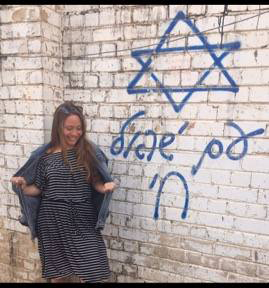- Home
- Play & Learn Home
- Online Enrichment
- Experience Modern Israel
- Israel It's Complicated
- Jewish and Me
- Jewish Holidays Jewish Values
- Jewish Values in Genesis and Jewish Values in Exodus
- Min Ha’aretz
- Our Place in the Universe
- Simply Seder
- The Prophets: Speaking Out for Justice
- Making T'filah Meaningful
- Make, Create, Celebrate
- Yom Haatzmaut Resources
- Hebrew Apps
- About The OLC
- What is the OLC?
- Introduction
- Get Started
- Resources
- OLC Content
- Parent Materials
- See My OLC Classes
- Store
Behrman House Blog
How Teachers in Israel Navigate Controversial Discussion in the Classroom
Written by Paige Goldner, 05 of June, 2017

Paige Goldner interned at Behrman House in 2016 and recently completed post-college study in Israel.
In any Jewish institution, it is difficult to avoid conversation about Israeli current events. With so many media outlets offering updates on terrorism, possibilities of a two-state solution, and other emotional-triggering topics, students are likely to go to their teacher for clarification, or perhaps voice their own opinion during class discussion. Is it the educator’s place to confirm or deny their students’ statements regarding controversial issues?
While studying abroad in Israel, I’ve had the opportunity to learn from exceptional teachers and accomplished mentors at Neve Yerushalayim, an institute for Jewish learning for women. Rabbi Boruch Smith, Rabbi Avraham Edelstein and Rebbetzin Raquel Kirszenbaum have taught unaffiliated and religious students in various schools and youth organizations in Israel for many years, and have consequently evolved into skilled pacifists. When faced with contentious situations in the classroom, my teachers are unanimous in their intent to deliver unbiased perspectives while encouraging unified appreciation for the land of Israel. Here are some useful tips they shared with me.
Validate the student.
Smith has taught in Israel for 30 years and advises that showing respect for the student and his or her comment is first and foremost. “Tell them you hear what they are saying, and perhaps encourage them to present their ideas in an essay or a blog post,” he suggests.
Edelstein, the Education Director of Neve Yerushalayim and CEO of Olami, a global funder of campus and young professional outreach, agrees with that methodology for defusing a potentially heated discussion: “Say to the student, ‘I want to hear more about what you’d like to say, so let’s get together another time so I can hear your position fully.’”
Admit that you don’t know the answers.
Educators must remove all personal bias. “We don't know what goes on behind the scenes, so we cannot come to a conclusion about who's right and who's wrong,” says Smith. “The issue is not whether you come to a conclusion,” adds Edelstein, “the issue is whether you learn how to approach issues with a Jewish mind.” Educators should reassure students that “I don’t know” is an acceptable resolution. “You don’t have to have an answer. It’s the journey that’s important here.”
Present all sides of the story and examine sources critically.
A student’s knowledge of Israel should not be based solely on television and the web. It is the duty of educators and parents to fill in the gaps and warn against propaganda. “We can assume that none of the information out there is completely right,” says Smith. “But we can explain that ‘this is the Israeli position, this is the Palestinian position, here’s the in-between position.’”
Kirszenbaum, who has taught Jewish women for 11 years both in Israel and around the world, recommends honestreporting.com as a source for her students to find authentic news. She also advises students to “read the whole article. The title gives room for a lot of interpretation and it is often misleading.”
Encourage students to write to Israeli pen pals.
As proud Jews, we do not want our youth to have anxiety or fear regarding the state of Israel. “The idea of going in to what is commonly seen on the news as a war zone would make anyone concerned or afraid,” says Smith. He suggests pen pals as a sincere method for students to discover the truth about what it’s like to live in Israel. An Israeli of the same age can explain to American students that they are comfortable going about their daily lives.
Establish a foundation of unity and pride.
Regardless of one’s perspective on Israel, educators must promote unity. “Israel is a family,” Kirszenbaum says. “Families have a lot of issues and they fight more with each other than anyone else, but at the same time, everyone always has each other’s back.” Students should not feel isolated by their religious or political views, but included in a community of individuals with varying opinions on how to reach the same goal: peace. “We are going to argue until we get to the truth,” she says. “We are looking for how we can all live together.”
Sensitive topics can be challenging, and are a key part of learning. By incorporating these tips into your pedagogy, you can filter out personal bias, build up Jewish pride in your classroom and advance your students’ skills in analyzing current events.

